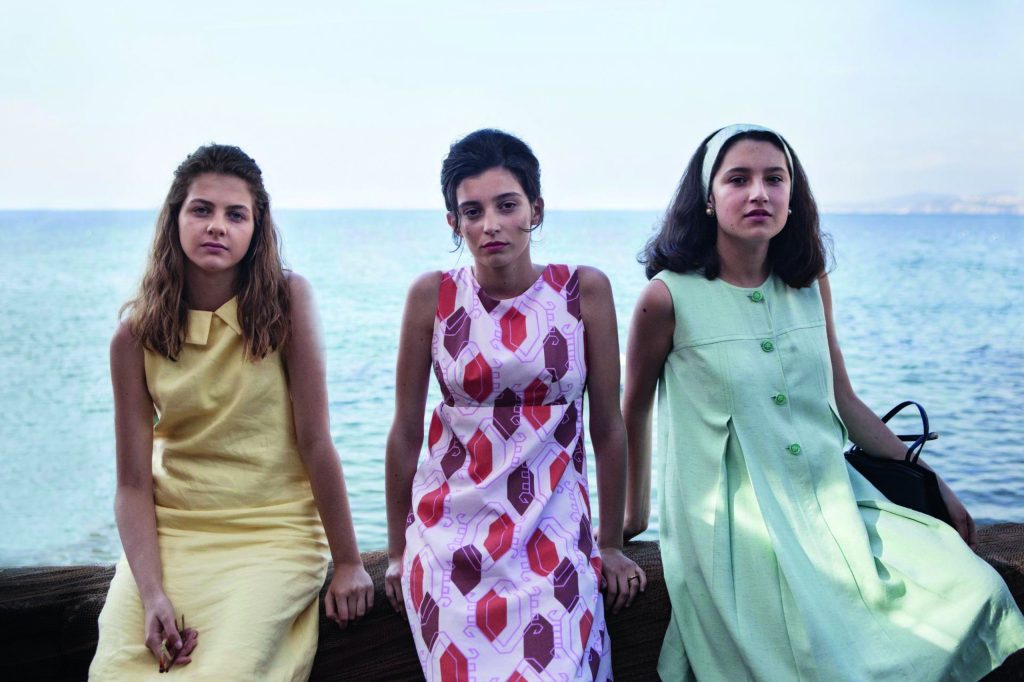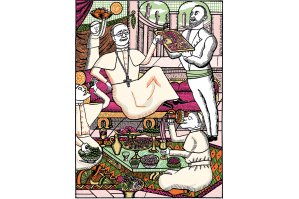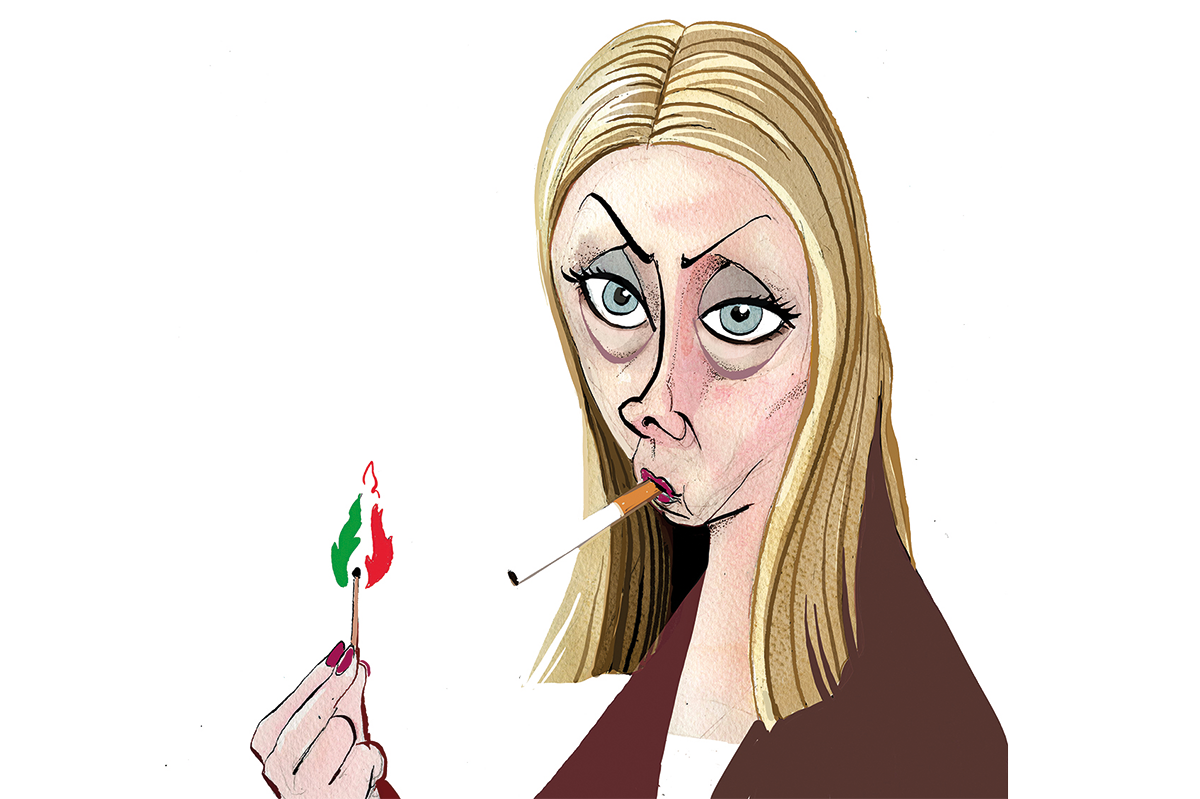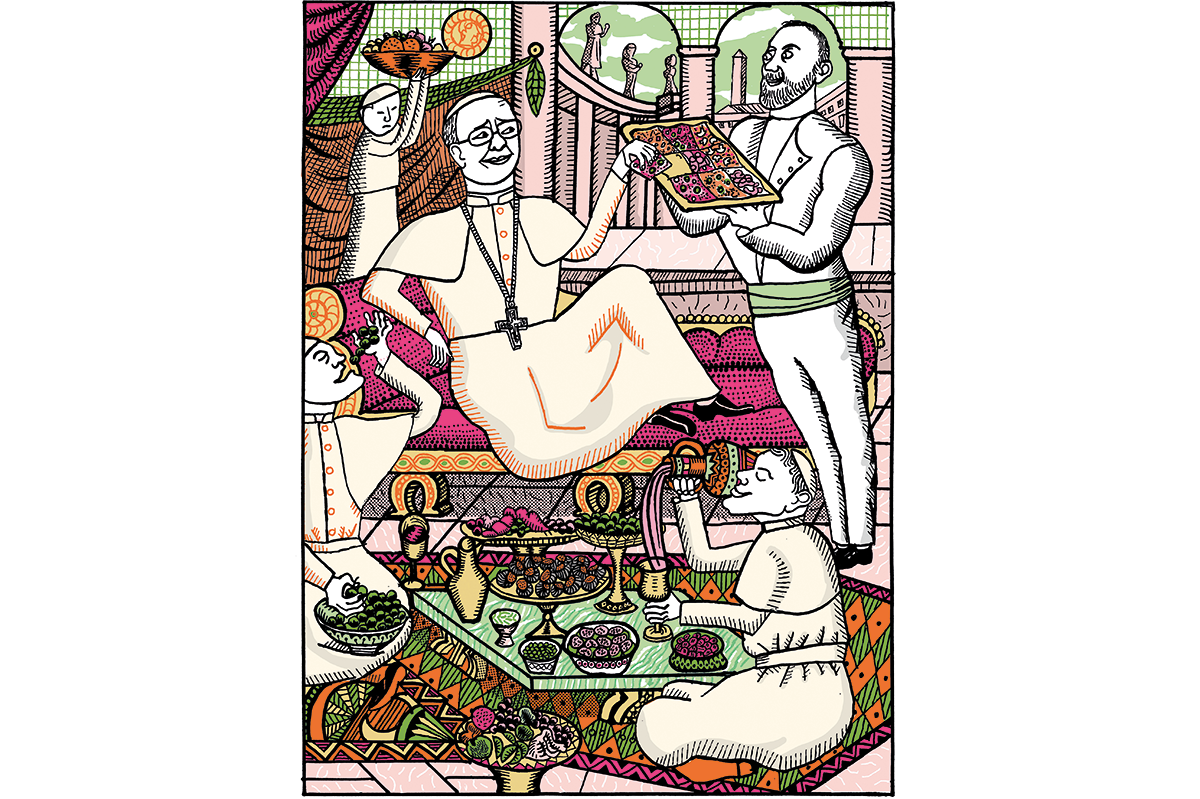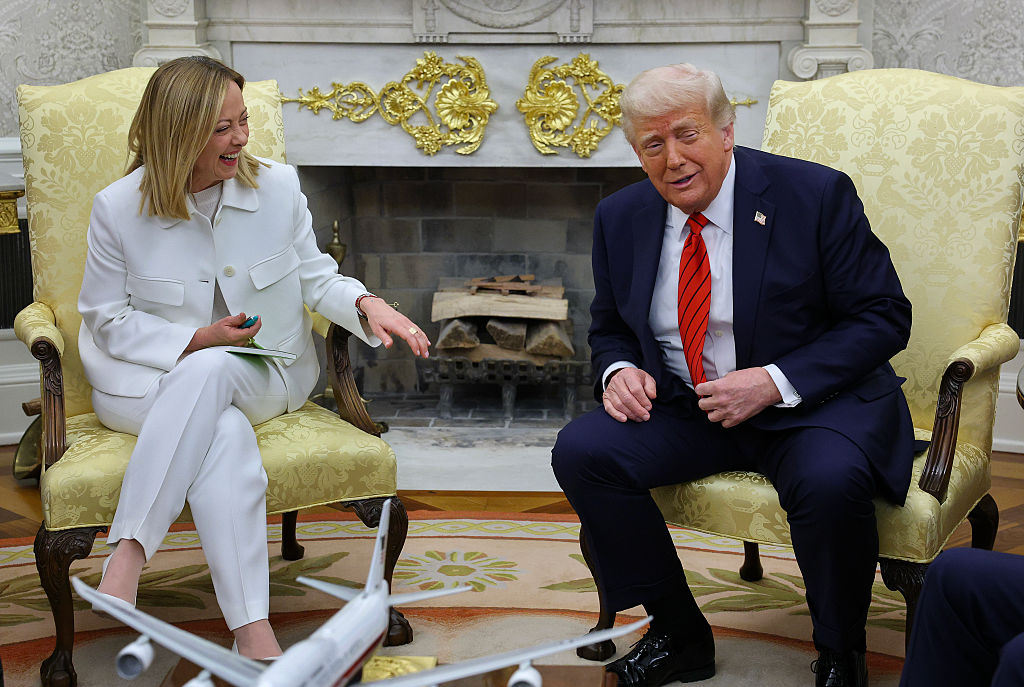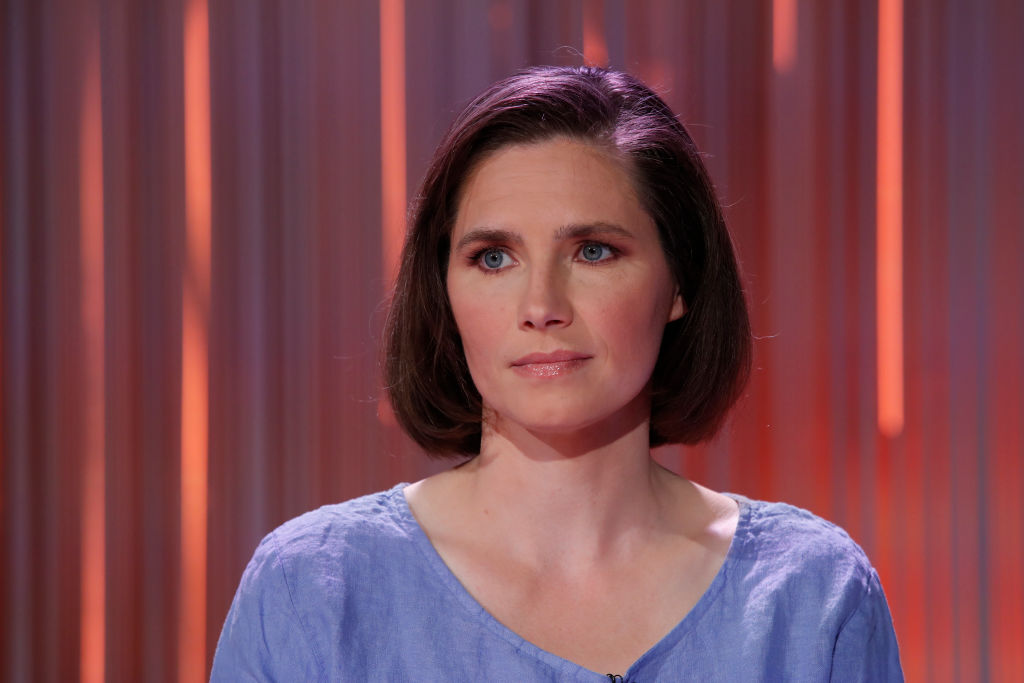As there’s nothing more annoying than when someone tells you ‘I told you so’, I shall refrain from telling you so for as long as possible. But it will be hard. There I was, lying on the couch one afternoon at work and reading Twitter, when I noticed LitHub appearing in my feed. Now, I am usually as glad to see LitHub in my feed as a prize race horse is to see cat food in his. LitHub is one of those trendy, sort-of academic websites that talks about things like ‘digital humanities’ and does its earnest best to take the fun out of reading and the point out of book-reviewing when, as any-one knows, reading and writing book reviews is a waste of time unless there’s blood and feathers everywhere by the end of the first paragraph.
Why, I wondered, had the algorithm sent me LitHub? Then I saw the title: ‘Have Italian scholars figured out the identity of Elena Ferrante?’ I had a short spasm of vindication. In 2015, after the third volume of Ferrante’s best-selling Neapolitan quartet had been published, I’d written an essay for the New Criterion on the difference between the real Italy and the Italy that we pay good money for when we go on vacation, and how the Ferrante novels seemed to smack of literary tourism, if not the sort of whole sale hustle that the Venetians call disneylandizzazione, or ‘Disneylandification’.
When the essay came out, people were quite rude.
I’d made the mistake of doing some cursory background research — I was still new to the reviewing game, you see. I was also new to the usual midlife obsession with Italy — la dolce vita, urban architecture, drinking at lunchtime and so on — so I’d bought some CDs and was suavely reciting Italian conversation on the school run. The legacy of my profound immersion in the culture of the people who brought you the Renaissance and the espresso is that, while I cannot read Dante, I can ask for my baggage to be sent to my room and remonstrate on the tardiness of the Florence-Bologna express. I can also make my way through an Italian newspaper, with a little help from my schoolboy Latin and my Google Translate. I decided that I would debut my new lingo in my big, high-concept Italian essay.
In about 10 minutes, my online investigations informed me that Elena Ferrante was not the female academic from a rough neighborhood of Naples that she and her English-language publishers, Europa Editions, claimed her to be. It seemed common knowledge in Italy that she was probably Domenico Starnone, a male novelist from a rough neighborhood of Naples, and he seemed to be working on the Ferrante project with his wife, Anita Raja, who is from Italy and really does seem to be a woman, but who is also a respected translator of upmarket European fiction.
The Italians — the real ones, not the actors we meet on our summer vacations — are, like most peoples with a long history, world-class cynics. Of course they hadn’t fallen for the Ferrante play. It’s preposterous that a writer with an uncanny feel for the international market in literary fiction would just emerge from nowhere in a country where everyone knows each other’s business, let alone emerge from the academy, of all places. Everyone knows that the academy is where literature goes to die.
Add to that the resentment any sensible writer would feel towards a country-man, or even a hypothetical country woman, who’s made it big in the States. The hacks of Italy, when not reciting CDs of English conversation on the school run, did what any decent literary critic would do. They dug up Raja’s tax returns and noticed that she’d made some chunky declarations just as Europa Editions had launched Ferrante in the US, even though she hadn’t changed her day job. They fed Ferrante’s novels into one of those computer programs that uses word patterning and choice to confirm or deny authorship. Then they fed Starnone’s novels into the program. The computer was in no doubt that Starnone was Ferrante.
The circumstantial evidence was convincing too. Raja was a translator for Starnone’s Italian publisher, E/O Editions. Starnone had written a novel of Neapolitan street life every year for two decades. He’d done well enough in Italy but failed to crack the big bucks of the translation market. In the same years, the typical buyer of literary fiction in the US had become a college educated white woman. The sort of woman who was ashamed she’d enjoyed Eat, Pray, Love, who’d been to college, who’d been to Italy. The sort of woman who might go for a novel of Neapolitan street life written by a woman, a novel that was full of the overwrought, tourist-friendly stuff we like, and was also gritty and graphic in that sophisticated European way, but without being too literary or too demanding like, say, Elsa Morante’s History.
When Starnone stopped banging them out, Ferrante started. Same setting, similar characters, similar plots and a protagonist whose name, Elena Greco, was close enough to Ferrante’s to suggest that this sordid, savory brew of neighborhood corruption and salami-eating sex mania might even be her personal history. The first Ferrante novel, My Brilliant Friend, was Europa’s Editions first play for the US market. It didn’t just get reviewed by every major outlet, which is unheard of for a first-time foreign translation. It got glowing reviews from them all.
The Boston Globe called Ferrante ‘a reclusive avant-garde genius’, even though there is nothing remotely avant-garde about her novels. The New York Times praised Ferrante’s ‘devastating honesty about some of the most uncomfortable facts of life, and especially of female life’. The New Yorker linked Ferrante’s writing to the ‘second-wave feminism’ that had produced ‘Hélène Cixous’s theory of l’écriture féminine’, or ‘feminine writing’, the ‘project of inscribing the feminine into the language of the text’.
Ferrante might not have written a masterpiece, but the Ferrante pitch was genius. It was a scam so smooth that the marks didn’t know they’d been fleeced; you could tell that because they kept coming back. A Ferrante industry developed: collections of Ferrante short stories and shopping lists, guides to Neapolitan backstreets in the weekend supplements, spreads on Ferrante fashion and home décor, and even a TV adaptation.
Ferrante’s authentic womanhood was central to all of this. In her emailed replies to interviews— tempting her readers to fantasize a little more about being her, she claimed she lived on a Greek island — she hinted that Elena Greco’s ordeal in the slums of Naples had been hers. This, the New York Times and everyone else who mattered all agreed, was a masterpiece by a woman, about the women, for the women. Remember, this was 2015. People expected Hillary Clinton to become the first woman president. Ferrante was the Flaubert of the Pantsuit Nation, a harbinger of Hillary’s page-turning, epoch-making presidency.
I’d enjoyed the first Ferrante novel, thought the second rang a bit false and found the third frankly implausible. At the time, I’d assumed this obvious decline in quality was because the publishers were milking the franchise for all its was worth. It didn’t cross my mind that Europa were milking Domenico Starnone for all he was worth, which turned out to be millions. I knew the book business is one big dairy; no wonder the later novels seemed cheesy. I hadn’t thought about Ferrante’s sex any more than I’d thought about Flaubert being a man when I’d read Madame Bovary or Tolstoy being a man when I’d read Anna Karenina; or that Elizabeth Jane Howard, a novelist that I also read that year, had been a woman when she’d created the male characters in her sequence of novels.
My wife was the one who put me on the trail. ‘Hm,’ she mused one evening as I hauled out the trash. ‘All that visceral stuff about sex and bodies and puberty but she glosses over the childbirth scene? Odd…’
When I sent my essay to Roger Kimball, he didn’t say, ‘Are you sure, old boy? This’ll be like poking a honey-caked stick into a hornet’s nest.’ He said, ‘Thanks. Nice bit of research. Didn’t know you spoke Italian.’
When the essay came out, an American professor of literature said that I was a sore loser in the battle of the sexes. Naturally, but what about the digital humanities and the tax returns, and the Italian hacks with their literary computer programs? I was, he wrote, a reactionary and a misogynist. Since then, I’ve noticed that anyone who states what notorious misogynist reactionary Al Gore called ‘inconvenient truths’ gets this treatment. My feelings have ceased to care about their feelings about my facts.
The Ferrante band wagon rolled on. In 2018, the Italian producers of the TV adaptation told Reuters that, though they’d worked for two years with Ferrante on the adaptation, they ‘still had no idea of the real identity of the author’. The director, Saverio Costanzo, said it was like ‘working with a ghost’. One of the producers, Lorenzo Mieli, called Ferrante’s identity ‘one of the most well-kept secrets in Italy’s history’. Did they think we were stupid? Yes, they did. Had we given them grounds to think that? Yes, we had.
So imagine my shock when I read that piece on LitHub by a Harvard grad student in late March. She’s used the same sources as I did, though she probably read them faster and without recourse to Google Translate, and it’s now respectable ‘scholars’, not unscrupulous hacks, who’ve fed Starnone and Ferrante into the computer. Seven years ago, it would have killed her career if she’d even entertained the notion that Elena Ferrante might really be a man. Now, when everything is a social construct, a man can be a womb-owner too and anyone who says otherwise is an essentialist, the same claim can make a career.
The Ferrante franchise made a fortune when it caught the zeitgeist, but the spirit of the times has changed. The shift in what is and isn’t acceptable to say about Ferrante in English is one of those increasingly rare moments when literature really does tell us something about real life. That’s the good news. The bad news is that all this wasn’t news at all. The truth was there on the internet in Italian all along. But it was ideologically unacceptable to look, or question a politicized ideal — until, that is, it became ideologically compulsory to question it in the name of a new politicized ideal.
Which brings me to the other bad news. If it’s now fine to say on LitHub that Elena Ferrante is a geezer because there’s no such thing as biological sex, then we’re already passed a watershed in what can and cannot be said about men and women. At least if you want to get on and up, and out of the slums.
I told you so.
This article was originally published in The Spectator’s May 2021 World edition.



